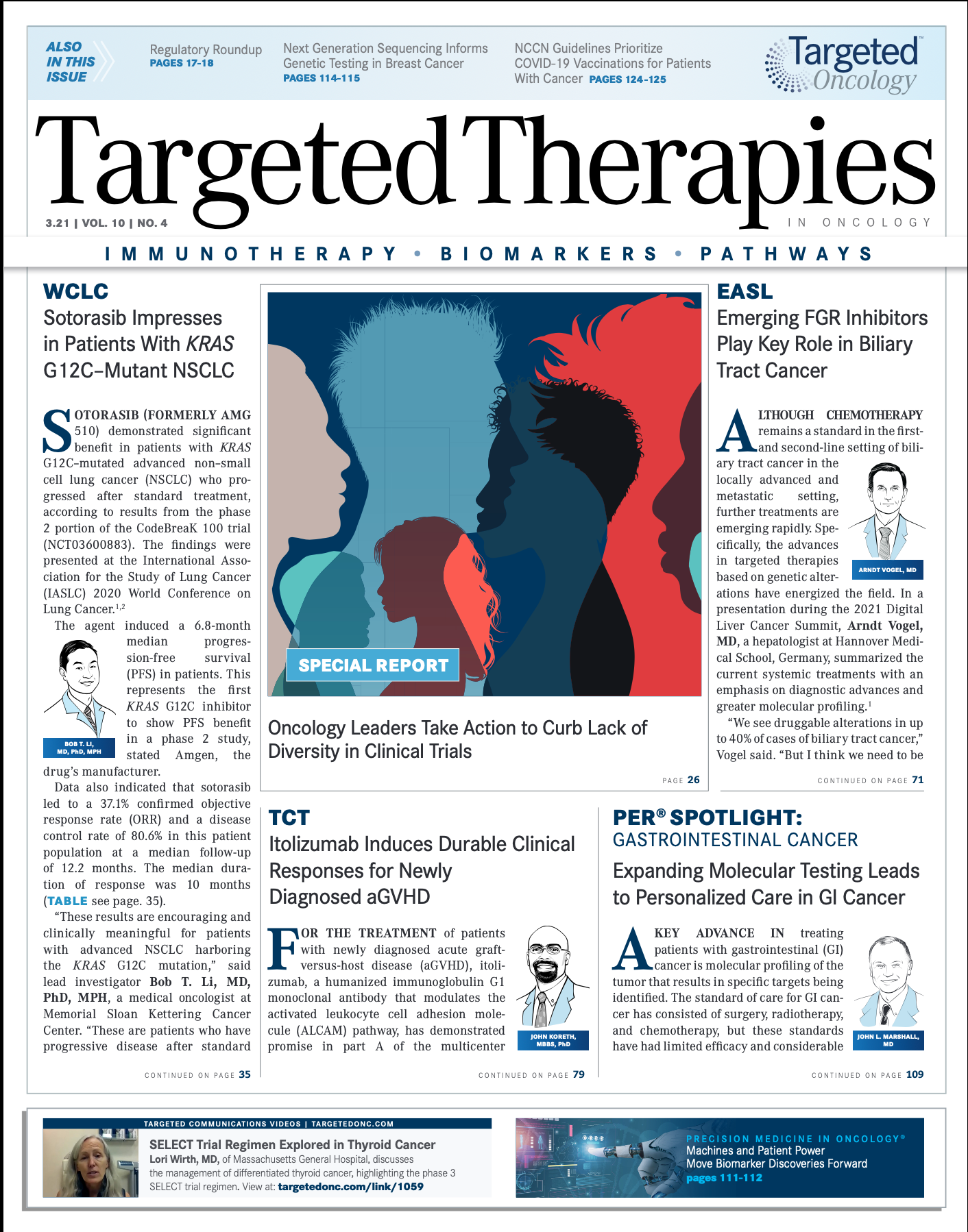NCCN Guidelines Prioritize COVID-19 Vaccinations for Patients With Cancer
Oncologists deciding what to do about coronavirus disease 2019 vaccines are not alone.
Brahm Segal, MD

Oncologists deciding what to do about coronavirus disease 2019 (COVID-19)vaccines are not alone. Which patient should be prioritized over another? Brahm Segal, MD, was prompted by that concern to join the National Comprehensive Cancer Network (NCCN) COVID-19 vaccine panel for patients with cancer.
“You look at how many different centers were represented (on the panel), and we were all struggling with the same issues and coming up with the same gaps in knowledge. We’re trying to do what we can to come up with answers,” said Segal, chair of the Department of Internal Medicine and chief of the Division of Infectious Diseases at Roswell Park Comprehensive Cancer Center in Buffalo, New York.
The first COVID-19 vaccine in the US outside a clinical trial was given on December 14, 2020. The NCCN guidelines for vaccinating patients with cancer were published on January 22, 2021, just more than a month after that newly emergency use authorized-vaccine was given.1
Although this is the panel’s preliminary 1.0 version set of recommendations, “the principles of vaccines are already there. The principles of immunology are the same,” Segal said. “That’s where we based our decision-making.”
Key Findings
The NCCN guidance, which were issued before the Emergency Use Authorization for the Johnson & Johnson vaccine, notes that patients with cancer are an at-risk population with an obvious need for vaccination to prevent associated morbidity and mortality. Included are patients in active treatment, those who were treated fewer than 6 months before, and those planning for future treatment. Here are the NCCN key findings, which recommend that clinicians:
Prioritize the vaccine for patients with cancer, as CDC priority group 1b/c. Patients should receive a COVID-19 vaccination as soon as it’s available to them.
Immunize all patients in active therapy, even with limited safety and efficacy data available for this population.
Delay vaccination for 3 months or more after a patient receives hematopoietic cell transplantation or engineered cellular therapy such as chimeric antigen receptor (CAR) T cells. This is to maximize vaccine efficacy, not for safety reasons. Vaccination also should be delayed for 3 months for any reasons the general population would also delay receiving a COVID-19 vaccine, such as recent exposure to the disease.
Immunize caregivers and close contacts, such as household members, when possible to do so.
The guidance also noted that vaccines should be equitably distributed to racial and ethnic minorities, non–English-speaking individuals, those with disabilities, and other economic and socially vulnerable risk groups that have been shown to be more affected by the disease.
How the Guidelines Were Developed
The guidelines do not rely on vaccine trial data for patients with cancer who are receiving active therapy, as there are no data at this time, Segal said. The panel consulted studies published in the Lancet and Nature Medicine that showed that patients with cancer who contracted COVID-19 had substantial rates of morbidity and mortality.2-4
“We knew certain patients with cancer have a higher risk for hospitalization and death,” Segal said. That includes comorbidities that are also common in the general population, such as older age, with the 80 years and older population being particularly vulnerable, he said.
Other common comorbidities that affect COVID-19 morbidity and mortality include heart disease, chronic lung disease, diabetes, high blood pressure, and chronic obstructive pulmonary disease. “These tend to increase risk and tend to be common in patients with cancer because it’s an older population,” Segal said.
The panel also relied on studies showing the safety of the Pfizer and Moderna vaccines, and those showing the disproportionate impact on racial and ethnic minorities.5,6
Efficacy and Safety Issues in the Cancer Population
The committee did not have concerns about safety issues in giving the COVID-19 vaccine to patients receiving treatment for cancer. The NCCN guidelines note that the available mRNA vaccines do not contain live virus and thus do not pose an immediate risk for safety issues in immunosuppressed patients. “We’re reasonably confident about safety, but we can’t be 100% sure that for every cancer therapy, there isn’t an interaction with the vaccine,” Segal said. Practitioners who immunize patients with cancer are carefully monitoring them for adverse effects, he said.
The main knowledge gap involves those patients who are immune compromised, he said. “We don’t know how effective the vaccine is in this population,” Segal said. These patients likely will have a decreased immune response compared with the general population, the guidelines note, and patients should be educated about following current prevention guidelines after they are vaccinated.
In addition, patients receiving checkpoint inhibitors and those receiving investigational agents may have an interaction with the vaccine that is currently unknown. “It was unanimous that this should not dissuade [individuals] from getting immunized,” Segal said. “The risk of COVID-19 complications is strong enough that we strongly encourage immunization, [even] knowing that there may be additional toxicities we still need to learn about.”
Prioritization and access issues
The committee also unanimously agreed that if a patient is receiving active cancer therapy, they should be prioritized over those whose cancer was cured, he said. The guidelines recommend prioritizing patients who plan to start treatment, as well (TABLE1). The panel acknowledged that prioritizing patients is both evidence- and values-based, and that clinicians may disagree about the prioritization rules. That debate could include patients with no current evidence of disease versus those with advanced cancer and a limited life expectancy.
However, the committee recommended prioritizing those with COVID-19-related mor-bidity and mortality factors, such as advanced age and specific disease processes, if there are vaccine shortages. Other risk factors for prioritization include those covered by social and demographic factors, such as limited access to health care or poverty.
The guidelines don’t address prioritization for patients receiving treatment in the cancer community. “We don’t specifically prioritize [individuals] with hematologic malignancies over solid tumors, even though [those with hematologic malignancies] are at greater risk for COVID-19 complications,” Segal said. “They also might be the ones who benefit the least.” The panel also did not recommend prioritizing based on treatment type, whether chemother-apy, radiation, surgery, targeted therapy, or immunotherapy. The panel did recommend that those receiving hormonal therapy, but with no active cancer, receive a lower prioritization.
Some oncology offices are determining their own prioritization list. “Logistically, we have to do it,” Segal said, as practitioners need to schedule appointments based on the number of vials they have. “By definition, that requires prioritization.” The guidelines note that multiple NCCN panel members’ facilities use scoring systems for prioritizing patients, based on age, comorbidities, metastatic or local disease, and hematologic or solid tumor malignancies.
Segal said his practice prioritizes those with hematologic malignancies because, in their experience, these patients have had more complications from the disease. But that is not prioritized in isolation. They also considered general comorbidities, and whether the patient is on active therapy. They also prioritize those with leukemia and receiving stem cell therapy over solid tumors. “We had to make that decision. We just don’t have enough vaccines to go around,” he said. They look at the patient’s risk factors and comorbidities and make a decision. “Across the board, cancer centers are grappling with this,” Segal noted.
Recommendations for Cancer Types
The guidelines recommend giving the vaccine to patients with hematologic malignancies when the vaccine is available. The exception is for those receiving intensive cytotoxic chemotherapy(such as cytarabine/anthracycline-based induction regimens for acute myeloid leukemia), in which case they recommend delaying the vaccine until the patient’s absolute neutrophil count recovers.
For patients with solid tumor malignancies, the panel recommends giving the vaccine when available, even if the patients are receiving cytotoxic chemotherapy, targeted therapy, checkpoint inhibitors and other immunotherapy, or radiation.
Patients who are stem cell transplant recipients need time for their immune system to reconstitute, especially after an allogenic transplant. “To give that patient a vaccine immediately would be a waste of vaccine,” Segal said. “It will be ineffective. You have to wait longer for the immune system to reconstitute, to maximize the chance the patient will respond.” The guidelines recommend waiting at least 3 months after allogenic or autologous transplantation, in addition to cellular therapy such as CAR T.
Patients who are undergoing surgery should separate the surgical and vaccine dates by a few days. Segal recommends not giving the vaccine before surgery. If there are any issues, it’s important to know whether they are surgical or vaccine-related.
Clinical Trials
The guidelines recommend national advocacy so patients participating in clinical trials can receive the COVID-19 vaccine. Patients shouldn’t have to choose between being in a trial and getting vaccinated, Segal said. “The general rule is, if they’re on a clinical trial, get the COVID-19 vaccine. I view vaccines as standard of care, not investigational,” he said. “I think it should be given [to patients] in clinical trials for cancer, even knowing that some drugs might be first-in-human use, and early-stage trials.”
That said, if patients are getting an anti-tumor vaccine in a clinical trial, the standard is to delay the COVID-19 vaccine. “The anti-tumor vaccine may be set on a schedule that you can’t delay. We agree with not delaying it,” Segal said. If a clinical trial sponsor says there is a contraindication in giving the patient a COVID-19 vaccine during a trial, Segal recommends telling them the vaccine is standard of care and endorsed by the CDC and the NCCN guidelines. “There’s not a good reason in the vast majority of [individuals] to delay the COVID-19 vaccination,” he said.
Future guidelines
This NCCN guideline set is preliminary. “We’re planning to write a more substantial set, but we wanted to get something up with consensus from the group,” Segal said. The biggest knowledge gap is knowing how effective the vaccine will be in different patients who have cancer. “So many different therapies for cancer target different parts of the immune system,” he said. Investigators aren’t conducting large, randomized trials for the vaccine in patients with cancer. Segal said his practice plans to measure antibody responses to the vaccine for different therapies.
The panel, which has 36 members, will add updates when they are available. “With COVID-19, everything is record turnaround time,” Segal said. The next update won’t take a year. “We’re working more on a scale of weeks to months,” he said.
REFERENCES:
1. NCCN. NCCN: cancer and COVID-19 vaccination. Version 1.0. January 22, 2021. Accessed February 14, 2021. https://bit.ly/2ZhkBFa
2. Kuderer NM, Choueiri TK, Shah DP, et al. Clinical impact of COVID-19 on patients with cancer (CCC19): a cohort study. Lancet. 2020;395(10241):1907-1918. doi:10.1016/S0140-6736(20)31187-9
3. Robilotti EV, Babady NE, Mead PA, et al. Determinants of COVID-19 disease severity in patients with cancer. Nat Med. 2020;26:1218-1223. doi:10.1038/s41591-020-0979-0
4. Lee LY, Cazier JB, Angelis V, et al. COVID-19 mortality in patients with cancer on chemotherapy or other anticancer treatments: a prospective cohort study. Lancet. 2020;395(10241):1919-1926. doi:10.1016/S0140-6736(20)31173-9
5. Polack FP, Thomas SJ, Kitchin N, et al. Safety and Efficacy of the BNT162b2 mRNA Covid-19 Vaccine. N Engl J Med. 2020;383(27):2603-2615. doi:10.1056/NEJMoa2034577
6. Baden LR, El Sahly HM, Essink B, et al. Efficacy and safety of the mRNA-1273 SARS-CoV-2 vaccine. N Engl J Med. 2021;384:403-416. doi:10.1056/NEJMoa2035389
